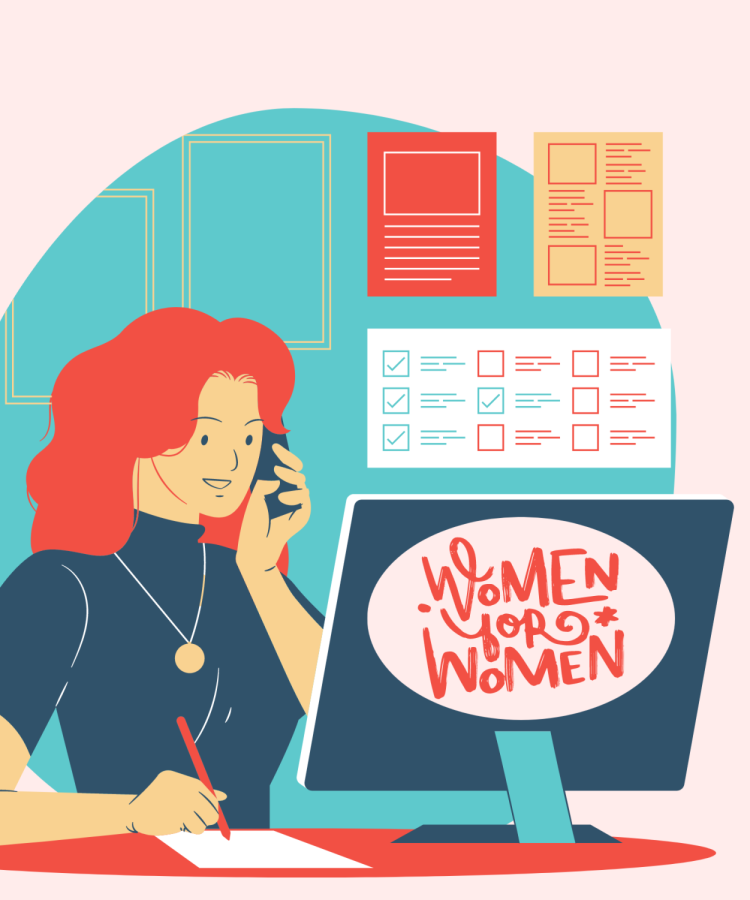The importance of maintaining femininity
February 9, 2023
The progress of women becoming more included in the boardroom and being seen as equally professional as their male counterparts does not come without its issues. The societal standards already placed on women become exceedingly more problematic when it comes to being a woman in the workplace.
Women are constantly pushing back barriers to make space for themselves due to the restrictions placed on them for being a woman. As a woman, we hear about what it means to be a professional and how to act as a leader. The traits used in these examples are what they see as traditional but we see as masculine traits before women were even allowed in the workspace. How can we progress as a society if we are rooting our expectations in a time when men and women were so drastically unequal to each other?
“No emotion in the boardroom.”
“This is a workplace, not a fashion show.”
“Don’t draw attention to yourself.”
“Just listen and learn from the professionals.”
Women are constantly conforming to the workplace that men have created, and their femininity is being pushed into a box, like they see feminine traits as dirty words. What is not discussed as often is how femininity can be a strength in the professional world.
A workplace benefits from individuals bringing their own strengths to the table, and it should not be just masculine traits, like being assertive and direct, that should be viewed as the best, but also feminine traits, like intuition, collaboration and even empathy. Emotion is looked down upon professionally with the expectation of being a shark and the “every man for themselves” aspect. A woman and her traits should not be restricted in the workplace just because they are seen as less valuable.
A woman is most powerful when she is in the state that she is without suppression. I should not need to stand here and discuss feminine traits and how they are beneficial in the workplace in order for them to be respected. Power comes from tapping into your strengths. The prospect of new ideas and methods being brought in through feminine traits can open up a range of opportunities that may have otherwise not been discovered because of the focus on maintaining a man’s workplace.
Even with the idea of feminine and masculine traits progressing towards not just associating with their respective genders and having more fluidity between them, the feminine traits are still undervalued in the workplace because of how non-beneficially they are viewed.
An example of this is empathy. The idea of keeping emotions out of the boardroom is outdated. It is OK to have emotions included in your work because emotion is not a bad thing. Emotion does not just mean getting emotional. It can be having sensitivity that helps one tune into those around you to see how you can best be a leader to them.
When you give up your femininity, you are also giving up your power. You are accepting the position given by a man and conforming to the shape they want you in. While it is easy for this to do so, in order for easy integration in the workplace and fewer issues with your co-workers, you are also giving up the parts of you that makeup who you are and the power that you hold.
Creating your own reality is an important idea to maintain as we continue to push back on these barriers of sexism in the workplace. We need to start normalizing femininity in the workplace as a strength because there is so much opportunity that can stem from it. Self-realization in the professional world, where people are able to use their own individual skills, should not just be restricted to skills that come out of masculine traits.
We can easily find a balance between feminine and masculine traits in the workplace. If a different perspective is always appreciated, why can’t that perspective and those ideas come from a feminine perspective?
So, maintain who you are as a woman, because the best results come from being your authentic self instead of squeezing yourself into this box that men have created for us. Our traits do not equate to how professional we are, and it should not have the power to define it.
As our friend Sarah Jessica Parker says, “Trying to be a man is a waste of a woman.”




